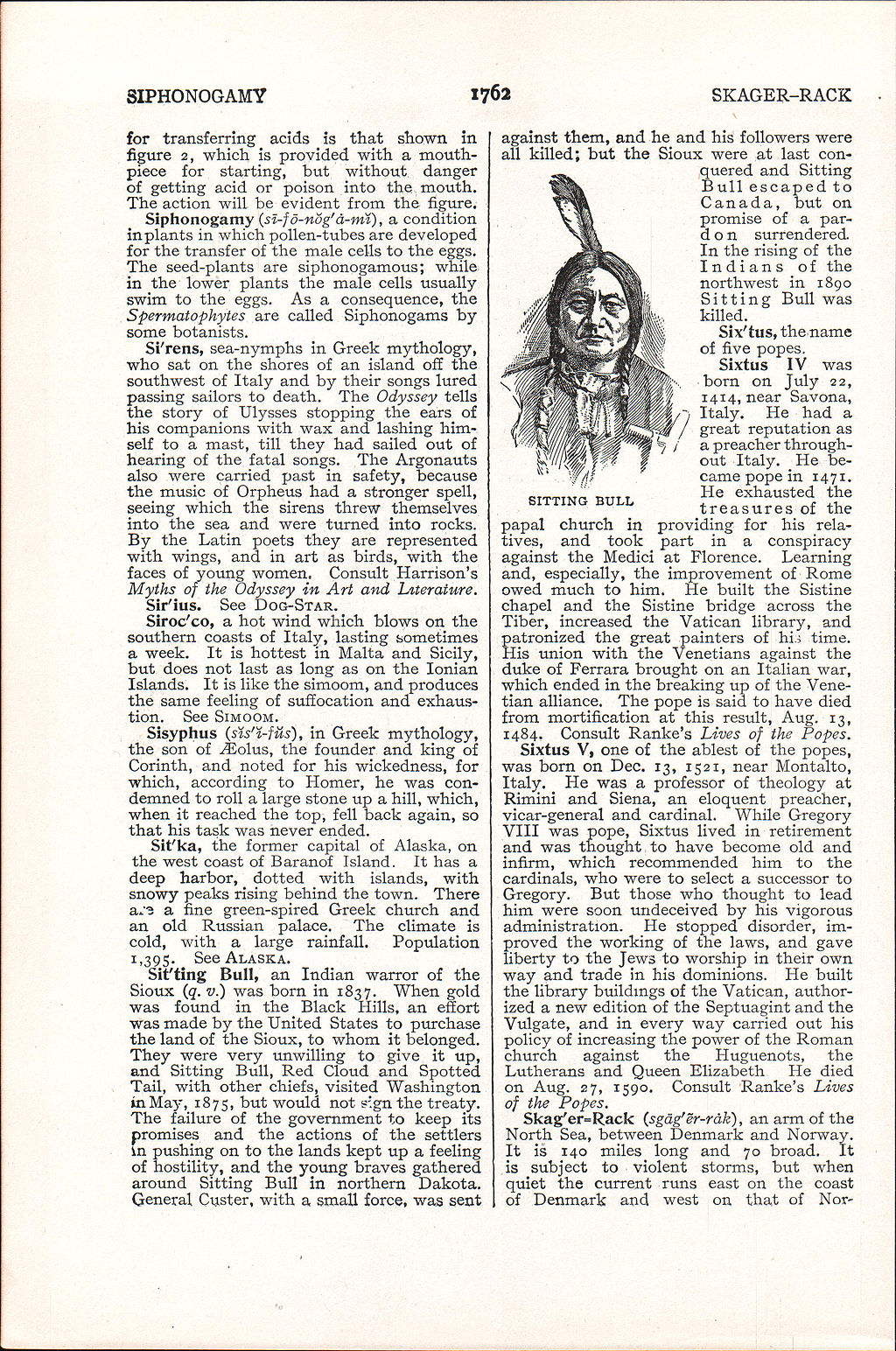for transferring acids is that shown in figure 2, which is provided with a mouthpiece for starting, but without danger of getting acid or poison into the mouth. The action will be evident from the figure.
Siphonogamy (sī-fō-nŏg′ȧ-mĭ), a condition in plants in which pollen-tubes are developed for the transfer of the male cells to the eggs. The seed-plants are siphonogamous; while in the lower plants the male cells usually swim to the eggs. As a consequence, the Spermatophytes are called Siphonogams by some botanists.
Si′rens, sea-nymphs in Greek mythology, who sat on the shores of an island off the southwest of Italy and by their songs lured passing sailors to death. The Odyssey tells the story of Ulysses stopping the ears of his companions with wax and lashing himself to a mast, till they had sailed out of hearing of the fatal songs. The Argonauts also were carried past in safety, because the music of Orpheus had a stronger spell, seeing which the sirens threw themselves into the sea and were turned into rocks. By the Latin poets they are represented with wings, and in art as birds, with the faces of young women. Consult Harrison's Myths of the Odyssey in Art and Literature.
Sir′ius. See Dog-Star.
Siroc′co, a hot wind which blows on the southern coasts of Italy, lasting sometimes a week. It is hottest in Malta and Sicily, but does not last as long as on the Ionian Islands. It is like the simoom, and produces the same feeling of suffocation and exhaustion. See Simoom.
Sisyphus (sĭs′ĭ-fŭs), in Greek mythology, the son of Æolus, the founder and king of Corinth, and noted for his wickedness, for which, according to Homer, he was condemned to roll a large stone up a hill, which, when it reached the top, fell back again, so that his task was never ended.
Sit′ka, the former capital of Alaska, on the west coast of Baranof Island. It has a deep harbor, dotted with islands, with snowy peaks rising behind the town. There are a fine green-spired Greek church and an old Russian palace. The climate is cold, with a large rainfall. Population 1,395. See Alaska.

|
| SITTING BULL |
Sit′ting Bull, an Indian warror of the Sioux (q. v.) was born in 1837. When gold was found in the Black Hills, an effort was made by the United States to purchase the land of the Sioux, to whom it belonged. They were very unwilling to give it up, and Sitting Bull, Red Cloud and Spotted Tail, with other chiefs, visited Washington in May, 1875, but would not sign the treaty. The failure of the government to keep its promises and the actions of the settlers in pushing on to the lands kept up a feeling of hostility, and the young braves gathered around Sitting Bull in northern Dakota. General Custer, with a small force, was sent against them, and he and his followers were all killed; but the Sioux were at last conquered and Sitting Bull escaped to Canada, but on promise of a pardon surrendered. In the rising of the Indians of the northwest in 1890 Sitting Bull was killed.
Six′tus, the name of five popes.
Sixtus IV was born on July 22, 1414, near Savona, Italy. He had a great reputation as a preacher throughout Italy. He became pope in 1471. He exhausted the treasures of the papal church in providing for his relatives, and took part in a conspiracy against the Medici at Florence. Learning and, especially, the improvement of Rome owed much to him. He built the Sistine chapel and the Sistine bridge across the Tiber, increased the Vatican library, and patronized the great painters of his time. His union with the Venetians against the duke of Ferrara brought on an Italian war, which ended in the breaking up of the Venetian alliance. The pope is said to have died from mortification at this result, Aug. 13, 1484. Consult Ranke's Lives of the Popes.
Sixtus V, one of the ablest of the popes, was born on Dec. 13, 1521, near Montalto, Italy. He was a professor of theology at Rimini and Siena, an eloquent preacher, vicar-general and cardinal. While Gregory VIII was pope, Sixtus lived in retirement and was thought to have become old and infirm, which recommended him to the cardinals, who were to select a successor to Gregory. But those who thought to lead him were soon undeceived by his vigorous administration. He stopped disorder, improved the working of the laws, and gave liberty to the Jews to worship in their own way and trade in his dominions. He built the library buildings of the Vatican, authorized a new edition of the Septuagint and the Vulgate, and in every way carried out his policy of increasing the power of the Roman church against the Huguenots, the Lutherans and Queen Elizabeth. He died on Aug. 27, 1590. Consult Ranke's Lives of the Popes.
Skag'er-Rack (sgäg′ẽr-rȧk), an arm of the North Sea, between Denmark and Norway. It is 140 miles long and 70 broad. It is subject to violent storms, but when quiet the current runs east on the coast of Denmark and west on that of Nor-
